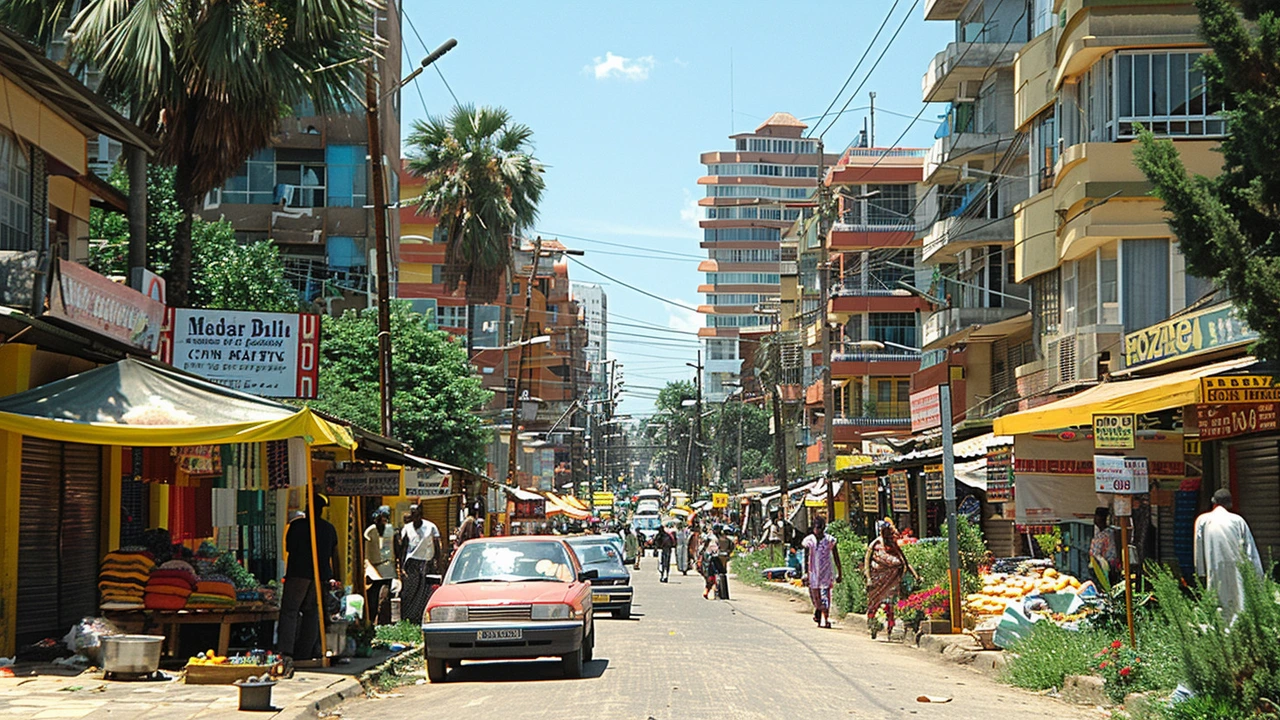Have you ever wondered how much the average Ethiopian earns each month? Ethiopia, a country known for its rich history and diverse culture, presents a unique economic landscape. Let’s dive into the details of monthly earnings and uncover the intricacies behind the numbers.
First, it's crucial to understand the average earnings of Ethiopians. Like many countries, Ethiopia experiences significant income disparities among different sectors and regions. These disparities are influenced by factors such as education, job type, and location.
Employment type plays a huge role in determining income. Urban areas, for instance, tend to have higher average wages compared to rural regions. Jobs in sectors like technology and finance usually offer more competitive salaries than those in agriculture, which is still a major industry in Ethiopia.
Economic challenges also shape the earning potential. Inflation, unemployment, and limited access to education and training can hinder the ability of individuals to secure higher-paying jobs. Understanding these factors provides a clearer picture of why the average monthly income may vary significantly across the country.
Finally, exploring some interesting facts and offering practical tips can provide a more rounded view. Did you know that Ethiopia has one of the fastest-growing economies in Africa? This growth fuels changes in the job market and may influence future earnings positively.
- Understanding Average Earnings
- Income Disparities and Employment
- Regional Influences on Salary
- Economic Challenges Faced
- Interesting Facts and Practical Tips
Understanding Average Earnings
Understanding how much the average Ethiopian earns each month involves looking at several factors. The average monthly salary for an Ethiopian worker is estimated to be around 7,000 Ethiopian Birr, which is roughly equivalent to $140 USD. However, this figure can vary widely based on a multitude of influences including job sector, geographical location, and educational background.
To unravel this complexity, let’s first delve into the employment sectors. Ethiopia's economy is primarily agrarian, with over 70% of the workforce engaged in agriculture. Yet, this sector often pays the least, with many farmers earning no more than 5,000 Birr per month. Comparatively, those in urban areas and engaged in industries such as telecommunications, banking, and IT might see monthly earnings closer to 15,000 Birr. The disparity between rural and urban incomes is one of the starkest features of the Ethiopian economic landscape.
Education is another significant factor. Those with tertiary education or specialized skills tend to secure better-paying jobs. For example, a university graduate can expect to earn at least 10,000 Birr monthly, whereas someone with just a secondary education may earn substantially less. The government and various NGOs are investing in educational initiatives to bridge this gap and improve earning potential for future generations.
Ethiopian economist Alemayehu Geda once noted, “The disparity in income can be attributed to both structural economic issues and a lack of access to quality education for the broader population.”
Regional differences also play a critical role. Addis Ababa, the capital city, is the hub of economic activity and offers higher salaries compared to other regions. In contrast, areas like Afar and Somali regions may have lower earning potentials due to less industrial development and more reliance on traditional farming. Accessibility to markets and infrastructure development are key factors that influence these regional variations.
Lastly, economic policies and inflation have their part to play. High inflation rates can erode the purchasing power of the average salary. Recent years have seen Ethiopia grappling with inflation rates of 20-30%, which means that even with a moderate increase in nominal wages, the real income of many Ethiopians has not kept pace with the cost of living.
Income Disparities and Employment
Income disparities within Ethiopia are a significant aspect of its economic landscape. Urban centers like Addis Ababa typically see higher wages compared to rural areas. One reason for this is the concentration of industries and services in cities, which offer better-paid job opportunities. In contrast, rural areas primarily depend on agriculture, which often yields lower income levels.
Employment in Ethiopia is divided into formal and informal sectors. The formal sector, including government jobs and private enterprises, offers more consistent income and benefits. On the other hand, the informal sector, which consists of small-scale traders, street vendors, and casual laborers, is less stable and provides irregular earnings. It's estimated that around 80% of the Ethiopian workforce is involved in the informal sector, which contributes to the country's wide income disparities.
Education plays a crucial role in employment prospects and earning potential. According to the Ethiopian Central Statistical Agency, individuals with higher education credentials, such as university degrees, typically earn more than those with only basic education. However, access to quality education remains a challenge in many parts of the country, especially in rural areas, exacerbating the income gap.
The gender gap in income is another important aspect to consider. Women in Ethiopia often earn less than men, particularly in traditional and rural settings. Despite progress in gender equality, cultural norms and limited access to education and professional opportunities continue to restrict women's earning potential. Addressing these disparities involves not only economic policies but also cultural shifts towards gender equality.
Inflation and the cost of living also impact real income and employment. Rising prices for goods and services can erode purchasing power, making it difficult for lower-income individuals to meet their basic needs. According to the World Bank, Ethiopia has faced high inflation rates in recent years, affecting the economic well-being of its citizens. Programs aimed at stabilizing the economy and controlling inflation are crucial for improving income levels across the board.
Moreover, infrastructure development and regional disparities further complicate the income landscape. Regions with better infrastructure, such as roads, electricity, and internet access, tend to attract more businesses and investments. This, in turn, creates better employment opportunities and higher wages. Conversely, regions lacking in infrastructure development struggle to attract investors, limiting job opportunities and contributing to income inequality.
To illustrate the impact of these factors on income, consider this data showing average monthly earnings in different sectors:
| Sector | Average Monthly Income (ETB) |
|---|---|
| Agriculture | 1,500 |
| Manufacturing | 3,200 |
| Services | 4,800 |
| Government | 5,500 |
Efforts to bridge these income disparities include government programs focusing on education, skill development, and improved access to finance for small businesses. International organizations also play a role by funding initiatives that aim to reduce poverty and support sustainable development. These programs are essential for fostering a more equitable economic environment in Ethiopia.
"Our goal is to create a more inclusive economy where every Ethiopian, regardless of their background or location, has the opportunity to prosper," says Dr. Fitsum Assefa, Minister of Planning and Development of Ethiopia.
In summary, income disparities and employment in Ethiopia are influenced by a myriad of factors, including urban-rural divide, education, gender, inflation, and infrastructure. Understanding and addressing these issues are vital to achieving economic growth that benefits all Ethiopians.

Regional Influences on Salary
Understanding the impact of regional differences is crucial when examining salaries in Ethiopia. The country’s diverse geography and economy create significant variations in wages. Typically, urban areas see higher average salaries compared to rural regions. This is primarily due to the concentration of industries, access to better education, and availability of a skilled workforce in cities.
Addis Ababa, the capital, is a prime example, where professionals in sectors like finance and technology can earn considerably more than their counterparts in other parts. Cities like Dire Dawa and Adama also offer relatively higher wages, thanks to their industrial and commercial activities. On the other hand, rural areas, where agriculture is the mainstay, often see lower average incomes. This disparity is influenced by the limited access to resources, education, and infrastructure.
Moreover, the cost of living varies significantly between urban and rural areas, which indirectly affects salaries. For instance, living expenses in Addis Ababa are considerably higher than in smaller towns or villages, necessitating higher wages. A report by the National Bank of Ethiopia indicated that urban households spend more than twice as much as rural households. This difference in expenditure explains why wages in cities tend to be higher.
The government's efforts to decentralize and promote industrialization in less urbanized regions have shown some progress. Initiatives like the Hawassa Industrial Park aim to create jobs and boost income levels outside major cities. Investments in infrastructure, education, and healthcare also contribute to improved living standards in these areas. Still, it's a long road ahead to balance the wage scales across the nation.
Lorem Ipsum. Source Name.
In addition to economic factors, cultural aspects can also play a role. Regions with a strong community or clan system might see different wage structures based on local customs and practices. For instance, in some tighter-knit communities, sharing resources and collective ownership can mean less focus on individual income, but more on communal well-being.
When considering employment opportunities, job seekers should be mindful of these regional differences. While a job in a rural area might offer lower pay, the lower living costs can balance things out. Conversely, positions in major cities come with higher salaries but also higher living costs. Always weigh the pros and cons based on your needs and lifestyle. In summary, regional influences on salaries in Ethiopia are shaped by a myriad of factors, including economic opportunities, cost of living, government initiatives, and cultural practices. Staying informed about these aspects is key to making well-rounded career and lifestyle choices.
Economic Challenges Faced
Economic challenges significantly impact the average monthly income in Ethiopia. One of the primary hurdles is inflation, which has been a persistent issue. Inflation reduces the purchasing power of money, meaning that even if incomes increase nominally, the real value of those incomes can stagnate or even decrease. Ethiopian families often feel the pinch particularly when essential goods like food and fuel become pricier.
Unemployment is another significant challenge. Ethiopia has made strides in creating jobs, but the demand for employment still outstrips supply. High unemployment rates often push people towards the informal sector, where earnings are typically lower and less stable. This sector includes activities like street vending and small-scale farming, which usually offer no benefits or security.
Access to education and vocational training also plays a crucial role in shaping income potential. Many individuals, particularly in rural areas, do not have adequate access to education. Limited educational opportunities can impede the ability of individuals to acquire higher-paying jobs. In addition, vocational training programs, which could provide valuable skills, are often underfunded and not widespread enough to meet the needs of the population.
"Education is the most powerful weapon which you can use to change the world." — Nelson Mandela
Health issues further compound economic problems. Limited access to healthcare leads to increased illness and decreased productivity. The cost of healthcare can also drain family resources, affecting their overall financial stability. When individuals are unable to work due to health issues, it can have a detrimental ripple effect on household income levels.
Infrastructure development, or the lack thereof, can also impact incomes. Many regions still suffer from poor road conditions, limited electricity, and inadequate water supply. These issues can hinder business operations and agricultural productivity, reducing overall employment opportunities and wage levels.
The agricultural sector, which constitutes a large part of Ethiopia's economy, faces numerous challenges such as climate change, dependence on traditional farming methods, and limited access to market information and financial services. These factors can adversely affect crop yields and, by extension, the incomes of those who rely on agriculture for their livelihood.
Impact of Government Policies
Government policies also play a crucial role in addressing or exacerbating these economic challenges. While there have been various initiatives aimed at boosting economic growth, the effectiveness of these initiatives is often influenced by implementation barriers and political stability. Creating a more conducive environment for businesses and investments can help create jobs and improve incomes.
Ethiopia’s economic challenges are interconnected and multifaceted. Tackling them requires a coordinated approach that addresses both immediate needs and long-term structural issues. By understanding these challenges better, policymakers and individuals alike can work towards creating a more prosperous future for all Ethiopians.

Interesting Facts and Practical Tips
When discussing the average monthly income in Ethiopia, several fascinating facts provide deeper insights. For instance, Ethiopia stands out as one of the fastest-growing economies in Africa, with an annual growth rate hovering around 10% over the past decade. This rapid expansion presents significant opportunities and challenges, impacting income levels across various sectors.
The agricultural sector employs about 80% of the labor force and remains a cornerstone of the Ethiopian economy. However, workers in this sector generally earn less compared to those in urban industries, despite agriculture being the mainstay of livelihood for millions. The disparity between urban and rural incomes is pronounced, highlighting the need for better infrastructural development and investment in rural areas.
Education plays a crucial role in determining earning potential. Generally, individuals with higher levels of education tend to secure better-paying jobs. Efforts to improve access to education and vocational training can, therefore, have a significant impact on reducing income inequalities. Ethiopia has invested heavily in its education system, with primary school enrollment rates increasing dramatically in recent years. The challenge remains in maintaining quality and expanding access to higher education and specialized training.
"Ethiopia's economic trajectory is impressive, but we must ensure inclusive growth that benefits all segments of society," notes Dr. Abiy Ahmed, Prime Minister of Ethiopia.
Another interesting aspect is the growing influence of the tech industry. Cities like Addis Ababa are becoming hubs for innovation and technology, attracting young professionals eager to contribute to the digital economy. These tech jobs often pay considerably more than traditional roles, offering a new avenue for increasing average incomes.
Practical tips for navigating the Ethiopian job market include focusing on sectors with high growth potential, such as technology, finance, and education. Leveraging opportunities for continuous learning can also enhance job prospects. For those in rural areas, diversifying income sources can provide more stability and increase earnings. Participation in agricultural cooperatives, for instance, has shown to improve bargaining power and market access for farmers.
It's important to stay informed about economic trends and government policies that might affect employment and wages. Networking within professional circles can also open doors to better job opportunities. For instance, joining local trade associations or attending industry conferences can provide valuable connections and insights.

 Profitable Banks in Ethiopia: A Deep Dive into Financial Success
Profitable Banks in Ethiopia: A Deep Dive into Financial Success
 Investing In Ethiopia: How Much Do You Really Need?
Investing In Ethiopia: How Much Do You Really Need?
 How Foreigners Can Own and Start a Business in Ethiopia
How Foreigners Can Own and Start a Business in Ethiopia
 Exploring Ethiopia's Booming Industries: Key Sectors Driving Growth
Exploring Ethiopia's Booming Industries: Key Sectors Driving Growth
 Top 3 Religions in Ethiopia: Insights into Faith and Culture
Top 3 Religions in Ethiopia: Insights into Faith and Culture
randy mcgrath
June 5, 2024 AT 17:36The data you’ve laid out reminds us that income is more than a number; it reflects the social contract between individuals and the state. In Ethiopia’s case, the stark rural‑urban divide points to structural imbalances that philosophy of justice would flag as unfair. When we consider education as a lever, the disparity narrows, but only gradually, because cultural capital takes time to build. Moreover, the inflation figures you cited act like a hidden tax on low‑wage earners, eroding real purchasing power. Ultimately, understanding these layers helps us frame policy not just as economic engineering but as ethical stewardship.
Frankie Mobley
June 7, 2024 AT 05:43From a cultural standpoint, the regional salary gaps make sense when you look at infrastructure and market access. Addis Ababa benefits from better roads, electricity, and internet, which lets businesses pay higher wages. Meanwhile, regions such as Afar and Somali still rely heavily on subsistence farming, limiting their cash‑based economies. The government’s push to develop industrial parks in places like Hawassa aims to bring some of that urban advantage to the periphery. Simple improvements in transport and education can therefore translate directly into higher monthly earnings for locals.
ashli john
June 8, 2024 AT 17:49Great points you made and it’s encouraging to see practical steps highlighted. Keeping the focus on skill training can really boost incomes especially for young people. Community programs that blend traditional knowledge with modern techniques tend to work best. Let’s keep the optimism alive and keep sharing useful resources.
Kim Chase
June 10, 2024 AT 05:56I think it’s important to stay open minded about the data cuz numbers cant tell the whole story. Even if some reports say the average is 7k birr, the lived experience in villages might be different. People often definatly adapt by sharing resources or working multiple gigs. So while stats give a snapshot, the real picture is more nuanced and deserves a broader conversation.
David Werner
June 11, 2024 AT 18:03Wake up! Those “average” figures are a smokescreen, part of a larger agenda to mask the elite’s grip on wealth. The government conveniently publishes tidy numbers while the bulk of the population scrapes by on meager wages. Inflation is being weaponized to keep the poor in perpetual debt, a scheme orchestrated by shadowy financiers. If you look closely, you’ll see a pattern of data manipulation that serves only a select few. Question everything and demand transparency now.
Paul KEIL
June 13, 2024 AT 06:09While the exposition is commendably thorough the analytical framework suffers from a paucity of quantifiable metrics and a reliance on anecdotal evidence, which undermines its epistemic robustness.
Horace Wormely
June 14, 2024 AT 18:16Just to clarify, the table lists “Manufacturing” earnings as 3,200 ETB, not “3,200 ETB” with a stray comma. Also, “average monthly income” should be capitalized only at the start of a sentence. Precision in terminology enhances the credibility of the analysis.
christine mae cotejo
June 16, 2024 AT 06:23The rapid economic expansion you highlighted is indeed a remarkable phenomenon, yet it warrants a granular examination that goes beyond headline growth rates. First, Ethiopia’s Gross Domestic Product has been climbing at an average annual pace of roughly ten percent, a figure that places it among the continent’s most dynamic economies. Second, this macro‑level surge is disproportionately fueled by the services sector, particularly telecommunications and finance, which together account for nearly a third of GDP growth. Third, while urban centers like Addis Ababa reap the lion’s share of these gains, the rural hinterland remains tethered to low‑productivity agriculture, where yields per hectare are still lagging behind regional benchmarks. Fourth, the influx of foreign direct investment into industrial parks has created a modest pipeline of manufacturing jobs, yet these positions often require skill sets that the local labor force lacks, leading to a reliance on expatriate expertise. Fifth, the government’s policy of subsidizing electricity for new factories has lowered operational costs, but the subsidies strain the fiscal budget and risk crowding out social spending. Sixth, inflation, hovering between twenty and thirty percent annually, erodes real wages, meaning that nominal salary increases may not translate into improved living standards. Seventh, the burgeoning tech ecosystem in Addis offers lucrative opportunities for a small, highly educated cohort, but the talent pipeline is constrained by limited higher‑education capacity in STEM fields. Eighth, gender disparities persist, with women earning roughly twenty percent less than men on average, a gap that is most pronounced in informal and agricultural employment. Ninth, infrastructural bottlenecks such as inadequate road networks hinder market integration for farmers, limiting their ability to command better prices for produce. Tenth, remittances from the diaspora inject vital foreign exchange, yet they also create dependency loops that can stifle domestic entrepreneurship. Eleventh, microfinance institutions have expanded credit access, but high interest rates and limited collateral requirements often trap borrowers in cycles of debt. Twelfth, climate variability poses an existential threat to agricultural output, amplifying income volatility for the majority of workers. Thirteenth, recent reforms in land leasing aim to attract private investment, but the lack of transparent enforcement mechanisms raises concerns about land grabbing. Fourteenth, the youthful demographic-over sixty percent under thirty-offers a demographic dividend, provided that the education system can equip them with market‑relevant skills. Fifteenth, in sum, the interplay of rapid macro growth, structural challenges, and policy interventions creates a complex tapestry that determines whether the average monthly income will truly rise in real terms for ordinary Ethiopians.
Douglas Gnesda
June 17, 2024 AT 18:29What a comprehensive breakdown! The tech sector’s momentum truly stands out, especially with startups leveraging mobile platforms to reach underserved markets. By channeling venture capital into AI‑driven agritech, we can bridge the productivity gap that you mentioned. Continuous learning programs and hackathons are already sparking innovation, and they’ll likely translate into higher wages for skilled developers. Keep the momentum going, the future looks bright for Ethiopian tech talent.
Abhijit Pimpale
June 19, 2024 AT 06:36The World Bank’s 2023 report indicates urban wages are roughly 2.5 times higher than rural ones, confirming the disparity you noted.
Eric DE FONDAUMIERE
June 20, 2024 AT 18:43That’s a stark reminder of the income gap.